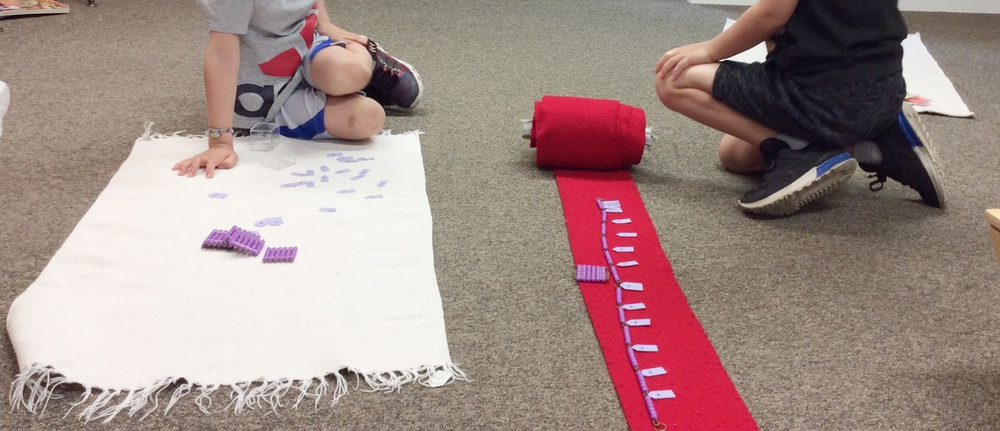
The Montessori Math materials offer concrete, manipulative experiences with concepts that most adults think about abstractly. Through these extended experiences with hands-on materials, children absorb the concepts more precisely and are able to understand them more thoroughly when they've become abstract ideas. While the National Council of Teachers of Mathematics now recommends this process for all teachers of math, Montessori pioneered the practice over a hundred years ago, observing the development in children from concrete to representational to fully abstract understanding and integrating that development in the design of the materials.
The Long Chains, for example, are a concrete manipulative that allows children to explore the relationships of squares to their roots. A series of ten chains, each is comprised of a series of the same quantity repeated until it is cubed. In other words, the Nine Chain is comprised of nine sets of nine sets of nine beads each, or 729 beads total. The Ten Chain is comprised of ten sets of ten sets of ten beads each, or a thousand beads. By counting out the chains, children are able to begin to identify the patterns of products in multiplication. By folding the chain into its cube, children can "build" the cube that is comprised of 9x9X9 or 10x10x10 or 5x5x5 (or any of the others in the series!) Thus, the idea of "cubingg a number" is not just an abstract label directing us to multiply the number by itself, but a concrete experience of the physical square that is the same width, depth and height as the number.
Make sense? For many adults, this is the first time they've appreciated that numbers' squares and cubes are actually physical squares and cubes that are created in the same proportions. A number squared creates a square with the width and height of that number. A number cubed creates a cube with the width, height and depth of that number. By building these concepts with their hands, in concrete and self-correcting experiences, the child is able to understand mathematical concepts that, in other styles of teaching, don't appear for many years.
Plus, they're beautiful! The chains are typically made of small glass beads that attract the child's interest and curiosity. Montessori recognized the development of the mathematical mind as one of the inherent tendencies of humans. It\'s our hope that, through experiences like these, math remains an intrinsically appealing adventure for children rather than a necessary chore.
#ForParents #ForTeachers #Curriculum #Math #FirstPlane #Primary
